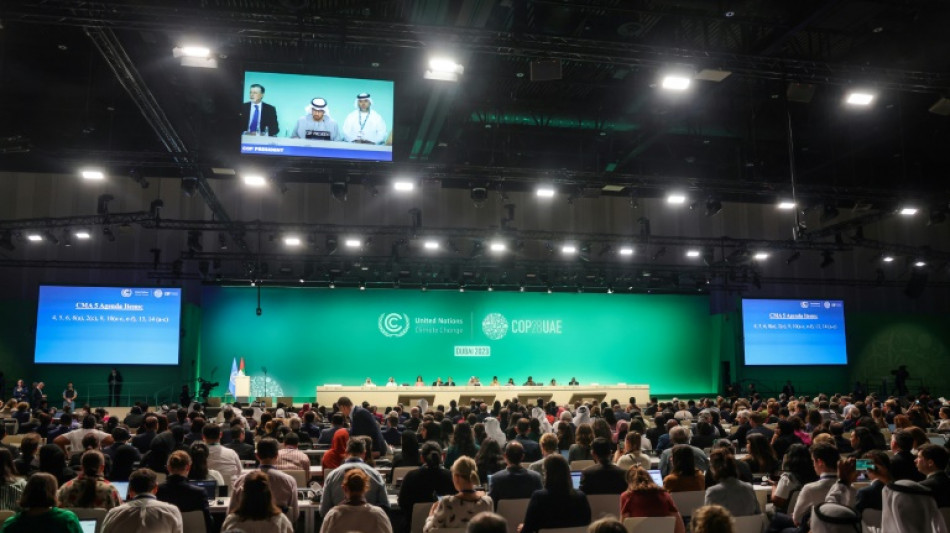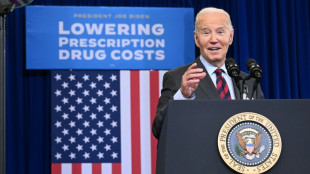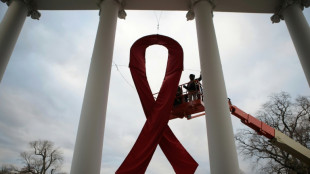
-
 Man City blow three-goal lead in Champions League, Bayern beat PSG
Man City blow three-goal lead in Champions League, Bayern beat PSG
-
Arsenal deliver Champions League statement of intent: Arteta

-
 Man City not 'stable', says Guardiola after Feyenoord collapse
Man City not 'stable', says Guardiola after Feyenoord collapse
-
League fines Hawks $100,000 for Young missing NBA Cup game

-
 Man City blow 3-0 lead to extend winless run in Feyenoord thriller
Man City blow 3-0 lead to extend winless run in Feyenoord thriller
-
Kim heads Bayern past 10-man PSG to dent Champions League hopes

-
 Lewandowski hits Champions League century as Barca beat Brest
Lewandowski hits Champions League century as Barca beat Brest
-
Inter take Champions League lead with narrow win over Leipzig

-
 Arsenal crush Sporting in Champions League to extend revival
Arsenal crush Sporting in Champions League to extend revival
-
Ceasefire in Israel-Hezbollah war to take effect

-
 Egyptian clubs go on scoring sprees in CAF Champions League
Egyptian clubs go on scoring sprees in CAF Champions League
-
Biden hails Lebanon ceasefire deal as 'good news'

-
 Brazil's Bolsonaro 'participated' in 2022 coup plot against Lula: police
Brazil's Bolsonaro 'participated' in 2022 coup plot against Lula: police
-
Barcelona striker Lewandowski scores 100th Champions League goal

-
 Autos, food: What are the risks from Trump's tariff threat?
Autos, food: What are the risks from Trump's tariff threat?
-
Alvarez, Correa net braces as Atletico thrash Sparta Prague

-
 Trump brings back government by social media
Trump brings back government by social media
-
Animal rights activist on FBI 'most wanted terrorist' list arrested

-
 Netanyahu seeks ceasefire after two months of war in Lebanon
Netanyahu seeks ceasefire after two months of war in Lebanon
-
Trump tariffs threat casts chill over Canada

-
 Hong Kong tycoon Jimmy Lai's court case a 'show trial': son
Hong Kong tycoon Jimmy Lai's court case a 'show trial': son
-
Blinken says Lebanon ceasefire talks 'in final stages'

-
 Mascherano re-unites with Messi as new coach of Inter Miami
Mascherano re-unites with Messi as new coach of Inter Miami
-
Real Madrid's Bellingham gone from 'scapegoat' to smiling

-
 Bangladeshi Hindus protest over leader's arrest, one dead
Bangladeshi Hindus protest over leader's arrest, one dead
-
Celtic fuelled by Dortmund embarrassment: Rodgers

-
 Salah driven not distracted by contract deadlock, says Slot
Salah driven not distracted by contract deadlock, says Slot
-
Algeria holds writer Boualem Sansal on national security charges: lawyer

-
 Biden proposes huge expansion of weight loss drug access
Biden proposes huge expansion of weight loss drug access
-
Saudi 2025 budget sees lower deficit on spending trims

-
 Pogba's brother, five others, on trial for blackmailing him
Pogba's brother, five others, on trial for blackmailing him
-
Prosecutors seek up to 15-year terms for French rape trial defendants

-
 Emery bids to reverse Villa slump against Juventus
Emery bids to reverse Villa slump against Juventus
-
Carrefour attempts damage control against Brazil 'boycott'

-
 Namibians heads to the polls wanting change
Namibians heads to the polls wanting change
-
Sales of new US homes lowest in around two years: govt

-
 Paris mayor Hidalgo says to bow out in 2026
Paris mayor Hidalgo says to bow out in 2026
-
Stocks, dollar mixed on Trump tariff warning

-
 ICC to decide fate of Pakistan's Champions Trophy on Friday
ICC to decide fate of Pakistan's Champions Trophy on Friday
-
Man Utd revenue falls as Champions League absence bites

-
 Russia vows reply after Ukraine strikes again with US missiles
Russia vows reply after Ukraine strikes again with US missiles
-
Trump threatens trade war on Mexico, Canada, China

-
 Motta's injury-hit Juve struggling to fire ahead of Villa trip
Motta's injury-hit Juve struggling to fire ahead of Villa trip
-
Cycling chiefs seek WADA ruling on carbon monoxide use

-
 Israel pounds Beirut as security cabinet to discuss ceasefire
Israel pounds Beirut as security cabinet to discuss ceasefire
-
Fewest new HIV cases since late 1980s: UNAIDS report

-
 4 security forces killed as ex-PM Khan supporters flood Pakistan capital
4 security forces killed as ex-PM Khan supporters flood Pakistan capital
-
Four bodies, four survivors recovered from Egypt Red Sea sinking: governor

-
 Ayub century helps Pakistan crush Zimbabwe, level series
Ayub century helps Pakistan crush Zimbabwe, level series
-
French court cracks down on Corsican language use in local assembly

| RBGPF | 1.33% | 61 | $ | |
| RYCEF | 0.44% | 6.8 | $ | |
| CMSC | -0.65% | 24.57 | $ | |
| SCS | -1.33% | 13.54 | $ | |
| BCC | -2.76% | 148.41 | $ | |
| BCE | -1.46% | 26.63 | $ | |
| GSK | -0.38% | 34.02 | $ | |
| RIO | -1.53% | 62.03 | $ | |
| BTI | 1.01% | 37.71 | $ | |
| NGG | -0.68% | 62.83 | $ | |
| RELX | 0.51% | 46.81 | $ | |
| VOD | -0.56% | 8.86 | $ | |
| CMSD | -0.61% | 24.43 | $ | |
| JRI | -0.98% | 13.24 | $ | |
| AZN | -0.06% | 66.36 | $ | |
| BP | -1.24% | 28.96 | $ |

Nations to submit boosted climate plans: what's at stake?
Nations have begun setting carbon-cutting targets for the decade ahead, and how ambitious these pledges are could make or break global efforts to avoid dangerous levels of climate change.
Nearly 200 countries are supposed to publish updated climate plans by early February, but so far only three have done so.
On Wednesday, the UK became the latest, announcing during the COP29 climate summit in Azerbaijan that it would raise its target to cut greenhouse gas emissions.
All eyes will be on other big polluters like China, India and the United States, though future US climate action is unclear following Donald Trump's election.
- Why do they matter? -
The world has agreed to try and limit global warming to 1.5 degrees Celsius above pre-industrial levels, but is nowhere near on track.
Above this threshold, scientists say humanity risks disastrous consequences from volatile weather to major ecological "tipping points" at land and sea.
Last month, the United Nations warned that even if all existing plans are implemented in full, temperatures would rise 2.6C by the century's end, a catastrophic outcome.
The UN says the next round of climate plans must show a "quantum leap" in ambition to avert the worst.
The G20 -- which accounts for 77 percent of total greenhouse gas emissions -- is under particular pressure to step up.
- Early movers -
Just before COP29 opened in Azerbaijan, the United Arab Emirates announced a 47 percent reduction in emissions by 2035 compared with 2019 in its updated climate plan.
Observers said the roadmap failed to account for exported emissions -- including those from its sales of crude oil abroad.
Next year's UN climate host, Brazil, has partly unveiled its plan, increasing its emissions reduction target from a 59 percent cut by 2035, from 2005 levels, to a 67 percent reduction.
It is expected to unveil a more complete plan during COP29.
Plans from other major emitters, like the European Union and China, are not expected until next year.
And the current US government could soon outline Washington's new pledge, despite questions over Trump following through once in office.
David Waskow, of the World Resources Institute, said it would help guide American cities, states and businesses wishing to continue climate action under Trump.
"It also sends an important signal internationally, a set of benchmarks for what the US ought to do," he added.
- What do countries need to do? -
By signing the Paris accord, nearly 200 nations agreed to halt rising temperatures "well below 2C" and strive for the safer goal of 1.5C.
But it did not prescribe how to get there.
The deal left it up to countries to voluntarily chart their own plans and targets, known as Nationally Determined Contributions (NDCs).
These include emission reduction targets and measures to achieve them, such as rolling out renewable energy, electrifying transport, and ending deforestation.
There is no set template for countries to follow but richer countries -- historically the largest emitters -- have a responsibility to pledge the deepest emission cuts.
The plans must be reviewed every five years, with each update supposed to be more ambitious than the last.
This time around countries are expected to improve their 2030 targets and outline economy-wide action they will take to 2035.
- What's the aim? -
An agreement at last year's COP28 climate summit "encouraged" countries to come forward with plans aligned with halting warming to 1.5C.
To have a hope of meeting that goal, emissions must be slashed 42 percent by 2030 and 57 percent by 2035, the UN's Environment Programme said last month.
Currently, however, emissions are continuing to rise.
Keeping 1.5C on track would require a collective effort "only ever seen following a global conflict", it added.
Without pulling together "on a scale and pace never seen before... the 1.5C goal will soon be dead," said UNEP executive director Inger Andersen.
The big moment for assessing progress towards the 1.5C goal comes at a crunch COP30 climate summit in Brazil next year.
- What about fossil fuels? -
Scientists and the International Energy Agency have said that developing new fossil fuel projects is incompatible with halting warming to 1.5C.
But many fossil fuel producing countries argue that new oil and gas projects will be needed as the world transitions to net zero emissions.
Countries are under pressure to outline in their updated plans how they intend to reduce their reliance on fossil fuels, something all nations agreed at last year's COP.
X.Matos--PC



